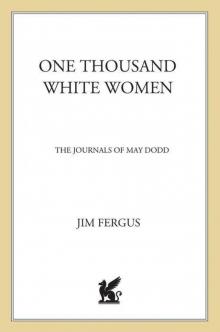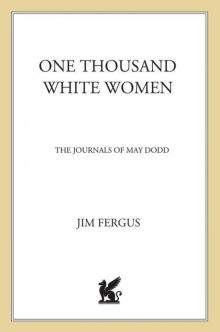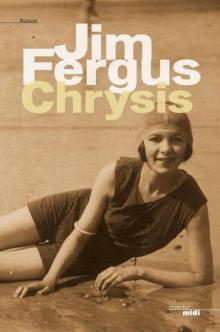- Home
- Jim Fergus
One Thousand White Women: The Journals of May Dodd Page 3
One Thousand White Women: The Journals of May Dodd Read online
Page 3
It was on one such night when Harry was away that Father’s blackguards came. They burst through the door of our house in the middle of the night accompanied by a nurse, who snatched up my babies and spirited them away as the men restrained me. I fought them for all I was worth—screaming, kicking, biting, and scratching, but, of course, to no avail. I have not seen my children since that dark night.
I was taken directly to the lunatic asylum, where I was consigned to lie in bed in my darkened room, day after day, week after week, month after month, with nothing to occupy my time but my daily torture and constant thoughts of my babies—I had no doubt they were living with Father and Mother. I did not know what had become of Harry and was haunted by thoughts of him … (Harry, my Harry, love of my life, father of my children, did Father reward you with pieces of gold to give me up to his ruffians in the middle of the night? Did you sell your own babies to him? Or did he simply have you murdered? Perhaps I shall never know the truth … )
All of my misery for the crime of falling in love with a common man. All of my heartbreak, torture, and punishment because I chose to bring you, my dearest children, into the world. All of my black and hopeless despair because I chose an unconventional life …
Ah, but surely nothing that has come before can be considered unconventional in light of where I am now going! Let me record the exact events that led me to be on this train: Two weeks ago, a man and a woman came into the ladies dayroom at the asylum. Owing to the nature of my “affliction” —my “moral perversion,” as it was described in my commitment papers (a sham and a travesty—how many other women I wonder have been locked away like this for no just cause!), I was among those patients strictly segregated by gender, prohibited even from fraternizing with members of the opposite sex—presumably for fear that I might try to copulate with them. Good God! On the other hand, my diagnosis seemed to be considered an open invitation to certain male members of the asylum staff to visit my room in the middle of the night. How many times did I wake up, as if suffocating, with the weight of one particularly loathsome attendant named Franz pressed upon me, a fat stinking German, corpulent and sweating … God help me, I prayed to kill him.
The man and woman looked us over appraisingly as if we were cattle auction, and then they chose six or seven among us to come with them to a private staff room. Conspicuously absent from this group were any of the older women or any of the hopelessly, irredeemably insane—those who sit rocking and moaning for hours on end, or who weep incessantly or hold querulous conversations with their demons. No, these poor afflicted were passed over and the more “presentable” of us lunatics chosen for an audience with our visitors.
After we had retired to the private staff room, the gentleman, a Mr. Benton, explained that he was interviewing potential recruits for a government program that involved the Indians of the Western plains. The woman, who he introduced as Nurse Crowley, would, with our consent, perform a physical examination upon us. Should we be judged, based on the interview and examination, to be suitable candidates for the program, we might be eligible for immediate release from this hospital. Yes! Naturally, I was intrigued by the proposal. Yet there was a further condition of family consent, which I had scant hope of ever obtaining.
Still I volunteered my full cooperation. Truly, even an interview and a physical examination seemed preferable to the endless hours of agonizing monotony spent sitting or lying in bed, with nothing to pass the time besides foreboding thoughts about the injustice of my sentence and the devastating loss of my babies—the utter hopelessness of my situation and the awful anticipation of my next “treatment.”
“Did I have any reason to believe that I was not fruitful?”—this was the first question posed to me by Nurse Crowley at the beginning of her examination. I must say I was taken aback—but I answered promptly, already having set my mind to passing this test, whatever its purpose. “Au contraire!” I said, and I told the nurse of the two precious children I had already borne out of wedlock, the son and daughter, who were so cruelly torn from their mother’s bosom.
“Indeed,” I said, “so fruitful am I that if my beloved Harry Ames, Esq., simply gazed upon me with a certain romantic longing in his eyes, babes sprang from my loins like seed spilling from a grain sack!”
(I must mention the unmentionable: the sole reason I did not become with child by the repulsive attendant Franz, the monster who visited me by night, is that the pathetic cretin sprayed his revolting discharge on my bedcovers, humping and moaning and weeping bitterly in his premature agonies.)
I feared that I may have gone too far in my enthusiasm to impress Nurse Crowley with my fertility, for she looked at me with that tedious and by now all too familiar expression of guardedness with which people regard the insane—and the alleged insane alike—as if our maladies might be contagious.
But apparently I passed my initial examination, for next I was interviewed by Mr. Benton himself, who also asked me a series of distinctly queer questions: Did I know how to cook over a campfire? Did I enjoy spending time outdoors? Did I enjoy sleeping out overnight? What was my personal estimation of the western savage?
“The western savage?” I interrupted. “Having never met any western savages, Sir, it would be difficult for me to have formed any estimation of them one way or another.”
Finally Mr. Benton got down to the business at hand: “Would you be willing to make a great personal sacrifice in the service of your government?” he asked.
“But of course,” I answered without hesitation.
“Would you consider an arranged marriage to a western savage for the express purpose of bearing a child with him?”
“Hah!” I barked a laugh of utter astonishment. “But why on earth?” I asked, more curious than offended. “For what purpose?”
“To ensure a lasting peace on the Great Plains,” Mr. Benton answered. “To provide safe passage to our courageous settlers from the constant depredations of the bloodthirsty barbarians.”
“I see,” I said, but of course, I did not altogether.
“As part of our agreement,” added Mr. Benton, “your President will demonstrate his eternal gratitude to you by arranging for your immediate release from this institution.”
“Truly? I would be released from this place?” I asked, trying to conceal the trembling in my voice.
“That is absolutely guaranteed,” he said, “assuming that your legal guardian, if such exists, is willing to sign the necessary consent forms.”
Already I was formulating my plan for this last major hurdle to my freedom, and again I answered without a moment’s hesitation. I stood and curtsied deeply, weak in the knees, both from my months of idle confinement and pure excitement at the prospect of freedom: “I should be deeply honored, Sir, to perform this noble duty for my country,” I said, “to offer my humble services to the President of the United States.” The truth is that I would have gladly signed on for a trip to Hell to escape the lunatic asylum … and, yet, perhaps that is exactly what I have done …
As to the critical matter of obtaining my parents’ consent, let me say in preface, that although I may have been accused of insanity and promiscuity, no one has ever taken me for an idiot.
It was the responsibility of the hospital’s chief physician, my own preposterous diagnostician, Dr. Sidney Kaiser, to notify the families of those patients under consideration for the BFI program (these initials stand for “Brides for Indians” as Mr. Benton explained to us) and invite them to the hospital to be informed of the program and to obtain their signatures on the necessary release papers—at which time the patients would be free to participate in the program if they so chose. In the year and a half that I had been incarcerated there against my will, I had, as I may have mentioned, been visited only twice by the good doctor. However, through my repeated but futile efforts to obtain an audience with him, I had become acquainted with his assistant, Martha Atwood, a fine woman who took pity on me, who befriended me. Indeed, Martha became my
sole friend and confidante in that wretched place. Without her sympathy and visits, and the many small kindnesses she bestowed upon me, I do not know how I could have survived.
As we came to know one another, Martha was more than ever convinced that I did not belong in the asylum, that I was no more insane than she, and that, like other women there, I had been committed unjustly by my family. When this opportunity presented itself for me to “escape,” she agreed to help me in my desperate plan. First she “borrowed” correspondence from Father out of my file in Dr. Kaiser’s office, and she had made a duplicate of his personal letterhead. Together we forged a letter in Father’s hand, written to Dr. Kaiser, in which Father explained that he was traveling on business and would be unable to attend the proposed meeting at the institution. Dr. Kaiser would have no reason to question this; he was aware of Father’s position as president of the Chicago and Northwestern Railroad, for which Father had designed and built the entire grain-elevator system—the largest and most advanced such warehouse in the city, as he is forever reminding us. Father’s job involved nearly constant travel, and as a child I rarely saw him. In our forged letter to Dr. Kaiser, Martha and I, or I should say “Father,” wrote that the family had recently been contacted directly by the government regarding my participation in the BFI program and that Agent Benton had personally guaranteed him my safety for the duration of my stay in Indian territory. Because Martha had been privy to the entire interview process, I knew that I had passed all the necessary requirements and had been judged to be a prime candidate for the program (not that this represents any great accomplishment on my part considering that the main criterion for acceptance was that one be of child-bearing age and condition, and not so insane as to be incapacitated. It is, I believe, safe to say that the government was less interested in the success of these matrimonial unions than they were in meeting their quota— something that Father, ever the businessman and pragmatist could appreciate).
Thus in our letter, Father gave his full blessing for me to participate in, as I believe we wrote “this exciting and high-minded plan to assimilate the heathens.” I know that Father has always viewed the western savages primarily as an impediment to the growth of American agriculture—he detests the notion of all that fertile plain going to waste when it could be put to good Biblical use filling his grain elevators. The truth is, Father harbors a deep-seated hatred of the Red Man simply for being a poor businessman—a shortcoming which Father believes to be the most serious character flaw of all. At his and Mother’s endless dinner parties he is fond of giving credit to his and his wealthy guests’ great good fortunes by toasting the Sac Chief Black Hawk, who once said that “land cannot be sold. Nothing can be sold but for those things that can be carried away”—a notion that Father found enormously quaint and amusing.
Too—and I must acknowledge this fact—I believe that secretly Father might actually have appreciated this opportunity to be rid of me, of the shame that my behavior, my “condition” has brought on our family. For if the truth be known, Father is a terrible snob. In his circle of friends and business cronies the stigma of having a lunatic—or, even worse, a sexually promiscuous daughter—must have been nearly unbearable for him.
So he went on in his letter, in his typically overblown but distracted manner—in the same tone he might employ if he were giving permission for me to be sent off to finishing school for young ladies (perhaps it is simply due to the fact that the same blood flows through our veins, but it was almost diabolically simple for me to imitate Father’s writing style)—to state his conviction that the “bracing Western air, the hearty native life in the glorious out-of-doors, and the fascinating cultural exchange might be just what my poor wayward daughter requires to set her addled mind right again.” It is an astonishing thing, is it not, the notion of a father being asked (and giving!) permission for his daughter to copulate with savages?
Enclosed with Father’s letter were the signed hospital release papers, all of which Martha had delivered by private messenger to Dr. Kaiser’s office—a tidy and ultimately perfectly convincing little package.
Of course, when her part in the deception was discovered, as it surely would be, Martha knew that she faced immediate dismissal—possibly even criminal prosecution. And thus it is, that my true, intrepid friend—childless and loveless (and if the truth be told rather plain to look upon), facing in all probability a life of spinsterhood and loneliness—enlisted in the BFI program herself. She rides beside me on this very train … and so at least I do not embark alone on this greatest adventure of my life.
24 March 1875
It would be disingenuous of me to say that I have no trepidations about the new life that awaits us. Mr. Benton assured us that we are contractually obligated to bear but one child with our Indian husbands, after which time we are free to go, or stay, as we choose. Should we fail to become with child, we are required to remain with our husbands for two full years, after which time we are free to do as we wish … or, at least, so say the authorities. It has not failed to occur to me that perhaps our new husbands might have different thoughts about this arrangement. Still, it seems to me a rather small price to pay to escape that living Hell of an asylum to which I would quite likely have been committed for the rest of my life. But now that we have actually embarked upon this journey, our future so uncertain, and so unknown, it is impossible not to have misgivings. How ironic that in order to escape the lunatic asylum I have had to embark upon the most insane undertaking of my life.
But honestly, I believe that poor naive Martha is eager for the experience; excited about her matrimonial prospects, she seems to be fairly blooming in anticipation! Why just a few moments ago she asked me, in rather a breathless voice, if I might give her some advice about carnal matters! (It appears that, due to the reason given for my incarceration, everyone connected with the institution—even my one true friend—seems to consider me somewhat of an authority in such matters.)
“What sort of advice, dear friend?” I asked.
Now Martha became terribly shy, lowered her voice even further, leaned forward, and whispered. “Well … advice about … about how best to make a man happy … I mean to say, about how to satisfy the cravings of a man’s flesh.”
I laughed at her charming innocence. Martha hopes to carnally satisfy her savage! “Let us assume, first of all,” I answered, “that the aboriginals are similar in their physical needs to men of our own noble race. And we have no reason to believe otherwise, do we? If indeed all men are similarly disposed in matters of the heart and of the flesh, it is my limited experience that the best way to make them happy—if that is your true goal—is to wait on them hand and foot, cook for them, have sexual congress whenever and wherever they desire—but never initiate the act yourself and do not demonstrate any forwardness or longings of your own; this appears to frighten men—most of whom are merely little boys pretending to be men. And, perhaps most importantly, just as most men fear women who express their physical longings, so they dislike women who express opinions—of any sort and on any subject. All these things I learned from Mr. Harry Ames. Thus I would recommend that you agree unequivocably with everything your new husband says … oh, yes, one final thing—let him believe that he is extremely well endowed, even if, especially if, he is not.”
“But how will I know whether or not he is well endowed?” asked my poor innocent Martha.
“My dear,” I answered. “You do know the difference between, let us say a breakfast sausage and a bratwurst? A cornichon and a cucumber? A pencil and a pine tree?”
Martha blushed a deep shade of crimson, covered her mouth, and began to giggle uncontrollably. And I, too, laughed with her. It occurs to me how long it has been since I really laughed … it does feel wonderful to laugh again.
27 March 1875
My Dearest Sister Hortense,
You have by this time perhaps heard news of my sudden departure from Chicago. My sole regret is that I was unable to be present whe
n the family was notified of the circumstances of my “escape” from the “prison” from which you had all conspired to commit me. I would especially have enjoyed seeing Father’s reaction when he learned that I am soon to become a bride—yes, that’s right, I am to wed, and perforce, couple with a genuine Savage of the Cheyenne Nation!—Hah! Speaking of moral perversion. I can just hear Father blustering: “My God, she really is insane!” What I would give to see his face!
Now, truly, haven’t you always known that your poor wayward little sister would one day embark on such an adventure, perform such a momentous deed? Imagine me, if you are able, riding this rumbling train west into the great unknown void of the frontier. Can you picture two more different lives than ours? You within the snug (though how dreary it must be!) confines of the Chicago bourgeoisie, married to your pale banker Walter Woods, with your brood of pale offspring—how many are there now, I lose track, four, five, six of the little monsters?—each as colorless and shapeless as unkneaded bread dough.
But forgive me, my sister, if I appear to be attacking you. It is only that I may now, at last—freely and without censor or fear of recriminations— voice my anger to those among my own family who so ill-treated me; I can speak my mind without the constant worry of further confirming my insanity, without the ever-present danger that my children will be torn from me forever—for all this has come to pass, and I have nothing left to lose. At last I am free—in body, mind, and spirit … or as free as one can be who has purchased her freedom with her womb …

 La Vengeance des mères
La Vengeance des mères The Wild Girl: The Notebooks of Ned Giles, 1932
The Wild Girl: The Notebooks of Ned Giles, 1932 One Thousand White Women
One Thousand White Women One Thousand White Women: The Journals of May Dodd
One Thousand White Women: The Journals of May Dodd Chrysis
Chrysis Strongheart: The Lost Journals of May Dodd and Molly McGill
Strongheart: The Lost Journals of May Dodd and Molly McGill The Vengeance of Mothers
The Vengeance of Mothers The Wild Girl
The Wild Girl